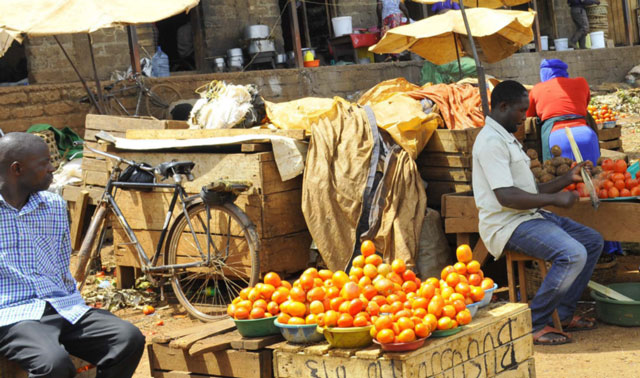
Lord Mayor reacts on President’s repossession directive
Kampala, Uganda | Patricia Akankwatsa | Capital City Authority (KCCA) Lord Mayor Elias Lukwago says wrangles over management of city the markets will not be a success unless the government approves a proper policy on markets in the country.
Lukwago was reacting to a directive from President Yoweri Museveni to KCCA to repossess all government markets, dissolve all conflicting leaderships, and organise fresh elections of leaders. The markets are Kisekka, Wandegeya, Bugolobi and Nakasero among others.
In the directive made in September, the President argued that the existing leaders are subjecting vendors to double taxation and extortion.
This directive was opposed by sections of leaders in the markets. They say they were legally voted into the office and in some cases, such as St. Balikuddembe (Owino) and Nakasero; they have leases on the land and cannot be removed without compensation.
Lukwago says the confusion created by the President’s directive goes back to the government not having a proper policy on markets in the country.
“There is no administration and ownership policy and there are no plans of structuring any,” Lukwago says.
“Unless they change the current law, the wrangles in the markets won’t end,” he adds, “The market Act 1942 is so old. We drafted an ordinance but it was never passed and we have never been given an explanation. ”
In November 2019, the KCCA Council passed the Kampala Capital City Ordinance, 2018 which sought to provide for a clear and comprehensive licensing for permanent, semi-permanent and temporary markets, overall management and control of all types of markets in the city, and processes through which market leaders in public markets can be elected.
KCCA waited for their Market Ordinance to be approved by the Attorney General before elections are conducted but in vain.

According to Section 7 of the 2010 KCCA Act, the Authority is mandated to, among others, initiate and formulate policy, and enact legislation for the proper management of the city.
Currently, all city markets, whether public or private, are dogged with fights which have led to stagnation of their development. As a result, some vendors, especially the poor, have ended up on streets because of failure to cope with conditions in city markets.
Whereas St Balikuddembe and Kisekka Markets were leased to the vendors’ associations, there are still disagreements between Nakasero Market Tenants Association and KCCA over the management of the facilities.
Vendors of Nakasero Market, which sits on two acres of land, accuse KCCA of interfering with their activities, arguing that the President made a directive that the market should be leased to them.
They have since stopped remitting revenue to KCCA and the matter is pending in court.
This is not the first time Museveni is interfering in running of city markets. St Balikuddembe, Shauriyako and Nakasero had at one time been contracted to city businessman Hassan Basajjabalaba by Kampala City Council (KCC), the predecessor of KCCA through his trading companies Sheila Investment, Yudaya International and Victoria International Company. But the government terminated the management contracts with the said companies, only to compensated Basajjabalaba dubiously with Shs160 billion.
All the three markets have been dogged with wrangles since they reverted to the vendors’ control following the presidential directive to revoke Basajjabalaba’s contracts.
Rita Atukwasa, the executive director Institute for Social Transformation (IST); an NGO working with women in markets says there is another problem: It is unclear how government plans to keep vendors in government-run markets as many find them expensive.
She points at the modern markets that the government has been building under the Markets and Agricultural Trade Improvement Project (MATIP) programme.
“What is the rate of vendor occupancy in the new markets?” she says, “Most vendors are left out due to high taxes and this is because of the unclear policy of revenue collection in the current law.”
The Minister of State for Kampala Capital City Authority, Benny Namugwanya, says the high cost on vendors will end as soon as the government takes over running of the markets.
“The exploitation has been orchestrated in all markets and abattoirs of Kampala in form of over taxation, inflated payment of water, electricity, toilet fees, maintenance, and security by the cliques without consideration of the vendors, sellers,” Namugwanya says.
In 2009, Parliament resolved to secure a loan of $70m from the African Development Bank and the Arab Bank for Economic Development in Africa to finance MATIP.
This was meant to increase production and marketing of agricultural commodities, enhance incomes of vendors, and increase employment and customer satisfaction.
The six markets are; Wandegeya, Ntinda, Nakulabye, Kasubi, Busega and Kansanga Nabutiti. However, it’s only Wandegeya market that has been constructed. Busega market is under construction while the rest are not.
Defects in the current law
The current law does not provide for the forum of dispute resolution between vendors and the controlling authority.
The Markets Act empowers a minister to make rules but it does not define or specify which minister is supposed to make these rules and so people are left to guess.
There is a rule to regulate revenue collection in markets with a view of expanding markets and promoting revenue collection. Non regulation of tax collection also leads to exploitation of market vendors and thus eventual resistance from tax payers.
The Markets Act does not define what a market is. Regulation of street markets, road side markets, car boot markets and mobile markets that were not envisaged in the law becomes impossible.
 The Independent Uganda: You get the Truth we Pay the Price
The Independent Uganda: You get the Truth we Pay the Price



